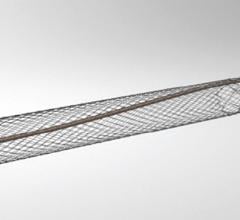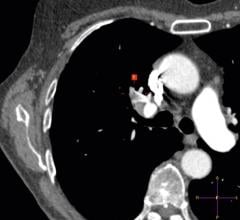
The cumulative incidence of MACE and all- cause of mortality in COVID-19 and non-COVID-19 pneumonia groups. Researchers analyze primary and secondary cardiovascular outcomes in 132,784 inpatients with COVID-19 (October 8, 2020 to September 30, 2021) and 31,173 inpatients with non-COVID-19 pneumonia (January 1, 2019 to December 31, 2019) in Korea. The results indicate a lower risk of cardiovascular disease in COVID-19 patients. Imge courtesy of Won-Young Kim from Chung-Ang University
January 11, 2024 — Acute cardiovascular manifestations of COVID-19, such as heart failure, thrombosis, and dysrhythmia, are associated with increased mortality. To address the limitations of prior studies on this topic, researchers from Chung-Ang University examined whether COVID-19 survivors faced higher cardiovascular risks compared to non-COVID pneumonia patients. They analyzed data from Korean hospitals and found no overall increase in cardiovascular issues among COVID-19 survivors.
The emergence of COVID-19 pandemic caused as a severe acute respiratory syndrome-coronavirus marked a global health crisis with over 770 million cases of infection and 6 million deaths by September 6, 2023. Around 6.2% of the recovered individuals, however, face lingering symptoms such as fatigue or respiratory problems. Although interstitial pneumonitis and severe acute respiratory distress syndrome are the main effects of COVID-19 on the lungs, the virus also affects other organs, especially the cardiovascular system. Despite this, previous studies assessing cardiovascular outcomes in post-acute COVID-19 patients were limited by insufficiently adjusting for preexisting cardiovascular conditions among hospitalized individuals.
To overcome this limitation, a team of scientists led by Dr. Won-Young Kim, along with Professor Sun Young Jung from Chung-Ang University, Korea, conducted a nationwide population-based cohort study. They aimed to explore the risk of cardiovascular outcomes among individuals who survived acute COVID-19 hospitalization without preexisting cardiovascular conditions. The results of their study was published online on 20 October, 2023, in BMC Medicine.
The researchers used hospitalized patients with non-COVID-19 pneumonia as a historical comparison control group. Explaining the rationale for this study design further, Dr. Kim says, “Previous studies that assessed the risk of cardiovascular outcomes after COVID-19 selected general hospital admission as controls, neglecting the potential cardiovascular risks following non-COVID-19 pneumonia hospitalization. In addition, the demographic composition of previous studies (based on mostly White and older male populations) may limit the generalizability of the results.”
The study utilized the Korean National Health Insurance Service database, encompassing nearly 97% of Korea's population. The database offered comprehensive details on demographics, diagnoses, treatments, and outcomes, linked to confirmed cases and vaccination information. The research focused on two groups—the first comprised 132,784 adults hospitalized for COVID-19 between October 2020 and September 2021, while the second consisted of a historical control group of 31,173 adults hospitalized for non-COVID pneumonia between January and December 2019.
The primary outcome measured was major adverse cardiovascular events, with secondary outcomes encompassing specific cardiovascular conditions and mortality. Various other subgroup and sensitivity analyses were conducted along with statistical analyses.
Interestingly, the researchers found no increased incidence of post-acute cardiovascular issues in those adults hospitalized with COVID-19 compared to those hospitalized for non-COVID-19 pneumonia. COVID-19 survivors exhibited lower risks of all-cause mortality, congestive heart failure, and cardiac arrest, but faced notably higher risks of acute myocarditis and deep vein thrombosis. Further, younger COVID-19 patients, especially those without cardiovascular risk factors, showed elevated risks of cardiovascular complications, implying that COVID-19 may be an independent risk factor in this subgroup. Sensitivity analyses with preexisting cardiovascular disease and subgroup assessments confirmed these trends, emphasizing the impact of COVID-19 on cardiovascular outcomes. Additionally, non-vaccinated COVID-19 patients exhibited increased risks of various adverse cardiovascular events.
Discussing the results further, Dr. Kim remarks, "Our results suggest that COVID-19 vaccination may prevent cardiovascular outcomes. This supports vaccination, especially for patients with preexisting cardiovascular disease."
This study is the first to compare the risk of cardiovascular outcomes between COVID-19 and non-COVID-19 pneumonia among the East Asian population. While prior Western studies suggested elevated cardiovascular risks post-COVID-19, this research has revealed low risks in Korean patients following acute COVID-19 hospitalizations. Going ahead, these findings can offer valuable insights for healthcare practitioners and policymakers to devise effective strategies for the long-term care of COVID-19 patients.
For more information: https://neweng.cau.ac.kr/index.do
RELATED LONG-COVID COVERAGE:
ACC23 Study Finds Long COVID More Than Doubles Risk of Developing New Cardiac Symptoms
ACC Scientific Session 2023 to Feature Smidt Heart Institute Experts
MRI Sheds Light on COVID Vaccine-Associated Heart Muscle Injury
What We Know About Cardiac Long-COVID Two Years Into the Pandemic
VIDEO: Long-term Cardiac Impacts of COVID-19 Two Years Into The Pandemic — Interview with Aaron Baggish, M.D.
VIDEO: Long-COVID Presentations in Cardiology at Beaumont Hospital — Interview with Justin Trivax, M.D.
VIDEO: Cardiac Presentations in COVID Long-haulers at Cedars-Sinai Hospital — Interview with Siddharth Singh, M.D.


 November 21, 2022
November 21, 2022 




